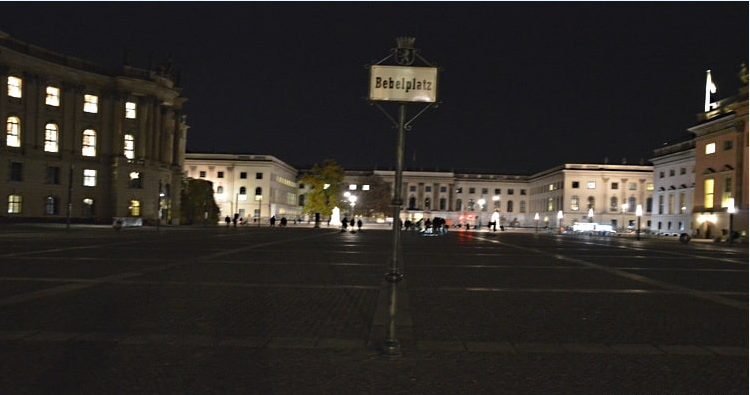The book burning in Berlin: Bebelplatz


Of course Berlin was one of the city trips I did. And yes, there are a lot of known historical places to talk about. But I didn’t forget the less famous one (like the Führerbunker I talked about in another article). Now, I want to talk about the Bebelplatz: the place where the Nazi book burning took place.
This book burning, also called ‘libricide’ or ‘biblioclasm’, took place in the heart of Berlin city. Years before the outbreak of World War Two. And even though it’s not a touristic square, I thought it was worth a visit.
The Nazi book burning in Berlin
It was on the 10th of May 1933 that the Nazi book burning in Berlin took place. Relatively early, seeing the later years of the Nazi regime and the Second World War. But even in 1933, it was a significant event. Even more for humankind I think. Because in total something like 250.000 books were burned in an attempt to erase them from our culture.
The purpose of this event was to make the ‘not-wanted’ literature dissapear. Symbolically and literally. And of course it was the Nazi regime itself that choose which literature and writers were no welcome anymore. That’s why they threw books of Karl Marx, Franz Kafka or H.G. Wells into the fire.
The book burning: Bebelplatz
It is hard to believe that this cultural-barbaric event happenedin the city centre of Berlin, on what then was called Opernplatz and now called Bebelplatz.
The square itself is pretty big, empty, dark and cold. With in the centre of it, one light: a monument. It is not an erected monument, because it’s a squared window in the floor of the platz. You can have an underground look here with a view on a series of white empty book shelves.
This monument makes you quiet, thinking about what happened. But you need to know what it means, because nowhere in this neighbourhood is info about the events that occurred there.
On the borders of the Opernplatz/Bebelplatz stand buildings that are suppose to show the greatness of the Roman culture (they wanted to name this place the Forum Fridericianum). Nowadays you find here the State Opera, library, cathedral and justice building.
And yes, around 250.000 books were burned. That’s a lot. Because not only in Berlin was a book burning. This barbaric event also took place in other German cities.
Is a book burning worth mentioning?
Yes, even though there was nothing really to see or find, I still think my visit to the Bebelplatz was worth it. Beside the fact it’s censure, it’s also very symbolic.
I think a quote of Heinrich Heine (19th century poet) sums it up: “Where books are burned, eventually also people will burn”
So when you are in Berlin, pass by the Bebelplatz and remember that not only people, but also our culture, can be threatened.
Were there other book burnings?
Yes, like I already mentioned: also in other German cities were book burnings. But even before and after the Nazi regime, people around burned books for several (mostly political) reasons. But that’s a story for another time!
If you want to read more about Nazi history, you can read my article about the Führerbunker or about the secret concentration camp on a British isle.
Recent Posts
The origin & history of cricket
It is a sport that is increasingly played worldwide and is the second most played…
The story of the lost island of Testerep
I am writing this article on a typical autumn day with low degrees but a…
The Herald of Free Enterprise 1987
Every year has its misfortunes, even my birth year 1987. And when I look at…
The history of Delft Blue: visit to the Royal museum
In 2023, I took a trip to Delft in the Netherlands (Europe), where you can…
Bialetti: history of a coffee pot
A while ago, I already wrote about the history of the cappuccino. It is only…
Nello and Patrasche: a dog of Flanders
The most Belgian (and Flemish) persons are perhaps Nello and Patrasche. They are fictional characters…